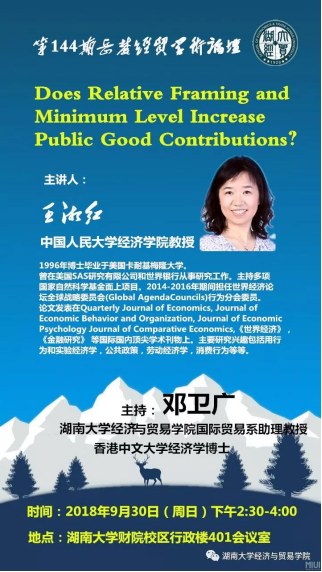第144期嶽麓經貿學術論壇預告
主 題:Does Relative Framing and Minimum Level IncreasePublic Good Contributions?
時 間:2018年9月30日(周日)14:30—16:00
地 點:77779193永利财院校區行政樓401報告廳
主講人:王湘紅(中國人民大學經濟學院教授。1996年博士畢業于美國卡耐基梅隆大學。)

主講簡介
王湘紅 中國人民大學經濟學院教授。1996年博士畢業于美國卡耐基梅隆大學。曾在美國SAS研究有限公司和世界銀行從事研究工作。主持多項國家自然科學基金面上項目。2014-2016年期間擔任世界經濟論壇全球戰略委員會(Global Agenda Councils)行為分會委員。
論文發表在Quarterly Journal ofEconomics, Journal of Economic Behavior and Organization, Journal of EconomicPsychology,Journalof Comparative Economics,《世界經濟》,《金融研究》等國際國内頂尖學術刊物上。主要研究興趣包括用行為和實驗經濟學,公共政策,勞動經濟學,消費行為等等。
内容簡介
Individual contributions topublic goods can be framed in absolute amount or as a relative proportion ofone’s income. This paper examines the effect of such framing on contributionsof group members to a public good in a laboratory experiment. The framingeffect can be resulted from shifting of reference points or fairness awareness.In our experiment, members in a group have high and low two endowments typesand they play public good games both without and with minimum contributionlevels (MCLs). As a treatment, both the contribution metric and MCLs areexpressed either in absolute amount or as a relative proportion of a groupmember’s endowment. The MCL is different in absolute amount for the high andlow type members, but it is the same proportion of their endowments for the twotypes. The number of high endowment members also varies as a treatment to groupcomposition. We find some important results that are consistent with ourhypotheses. First, without MCL, the relative metric significantly reducescontributions, especially for the low types; the reduction also comes from morefree riders. Second, the introduction of MCL significantly increases contributions.Third, the relative framing of MCL increases contributions more than the absoluteMCL, therefore the difference between absolute condition and relative conditionalmost disappear after MCL is introduced. Fourth, the average group contributionis increased by the number of high type members in a group. We discuss theoriesand implications of these findings.
發表記錄
Babcock, Linda;George Loewenstein and Xianghong Wang. 1995. "The Relationship between Uncertainty, the Contract Zone, andEfficiency in a Bargaining Experiment." Journal of Economic Behavior& Organization, 27(3), 475-85.
Babcock, Linda; Xianghong Wang and George Loewenstein. 1996. "Choosing the Wrong Pond: Social Comparisonsin Negotiations that Reflect a Self-Serving Bias." Quarterly Journal of Economics, 111(1), 1-19.
Wang, Xianghong. 2009. "Retail Return Policy, Endowment Effect, and ConsumptionPropensity: An Experimental Study." B.E. Journal of Economic Analysis& Policy, 9(1), 38-38.
Wang, Xianghong. 2012. "When Workers Do Not Know – the Behavioral Effects of MinimumWage Laws Revisited." Journal of Economic Psychology, 33(5),951-62.
Nie, Huihua; Minjie Jiang and Xianghong Wang. 2013. "The Impact of Political Cycle: Evidence fromCoalmine Accidents in China." Journal of Comparative Economics,41(4), 995-1011.
Kocher, Martin G.; Peter Martinsson; Emil Persson andXianghong Wang. 2016. "Is There a HiddenCost of Imposing a Minimum Contribution Level for Public GoodContributions?" Journal of Economic Psychology, 56, 74-84.
王湘紅, 孫文凱, 任繼球. 相對收入對外出務工的影響:來自中國農村的證據[J]. 世界經濟,2012(5):121-141.
王湘紅, 陳堅. 社會比較和相對收入對農民工家庭消費的影響——基于RUMiC數據的分析[J]. 金融研究,2016(12):48-62.